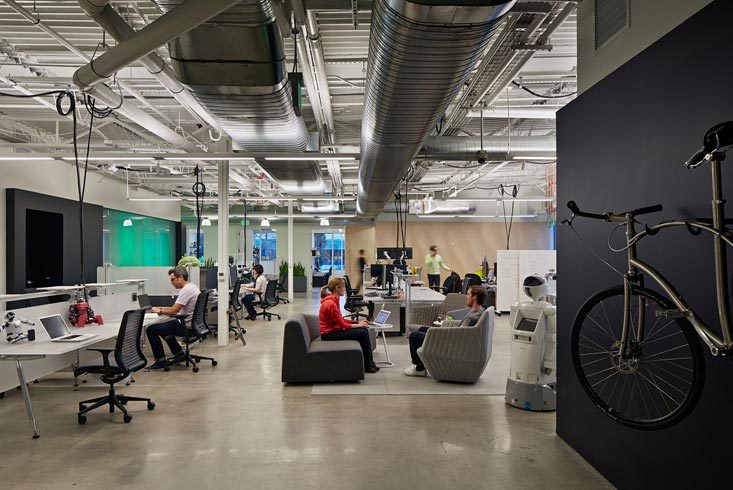What are needed startups: A list of areas for development

There are many ideas for startups, and, sometimes, we have been waiting for years for someone to launch a new project in a particular area. For greater clarity, we have developed a list of ideas for successful startups in which we would like to invest. Do not run the project, relying simply on the list presented by us. We have created this list to just push you to ideas, inspire.
Many of the areas proposed by us can in fact be classified as “new technologies”, but most of the ideas presented by us belong to the long-standing, already tested in the past areas of the Internet and mobile technologies. So, if, before reading this post, you wanted to do just that, just continue. Classic startups, such as Google or Facebook, are in fact very, very important and, despite their traditionalism and "ordinary", are also a kind of "breakthroughs".
')
The following is a list of some areas in which we are particularly interested. In short, any industry involving the simplification of people's lives through technology is our element.

1. Energy industry
There is simply a striking link between quality of life and energy costs. Let us turn to history and recall at least the moment of the creation of the steam engine: the energy tariffs have plummeted, the quality of life, on the contrary, has skyrocketed.
Lowering energy prices would actually reduce the percentage of poor people around the globe. In addition, new energy resources could help the environment, the economy, reduce the number of wars, provide generations with a stable future, increase the amount of food and water, and much more.
It seems to us that the greatest impact will be made on the economy - new resources should be cheaper, dispense with subsidies and meet global demand. Nuclear power, along with renewable energy sources, can [unchecked] increase in price, but the issue of pricing [for us] is a first order question.
In addition to all the above, we are also interested in the storage and transmission of energy. Batteries, improved 10 times, will help us to get acquainted with new convenient inventions, as well as facilitate the movement of energy in space.
2. Artificial Intelligence
Given the potentialities of artificial intelligence, it seems that now people of a small mind are working on it [joke]. Many scientists and researchers are talking about artificial intelligence fascinated and with a share of fear, and for good reason. But it seems that this invention will become a point of reference: the history of technology and technology will be divided into clear “before” and “after”, and these two periods will be completely different.
3. Robotics
Robots are everywhere: everything we have to do in everyday life will be associated with them. We see this industry quite extensive and large-scale. For example, we expect robots to take over automatic driving. Probably, they will also be the main assistants in the study of the Universe, and, perhaps, of the human body.

4. Biotechnology and genetic engineering
Of course, it is too early to draw conclusions, but it seems that we are finally making progress in the use of biology for the benefit of mankind. There are many areas of development of this industry: the fight against disease, slowing down the aging process, combining people and computers, the ability to download and view old memories, genetic programming and others. We know for sure that the results of work in this field over the next several decades will be shocking, powerful and very ambiguous. This is about the same as microcomputers in the 70s.
Reading data from DNA has become an incredibly fast and cheap process, there are many ways to use this opportunity for the benefit of man. The area of modeling in this area is also developing. We are especially interested in the competent use of all the possibilities of biotechnology in order to prevent our own mistakes. For example, if the bad guys quickly create new contagious diseases and infections, then it would be nice if the good ones instantly create vaccines and new drugs.
5. Health
The health care system [in the USA] leaves much to be desired. We are approaching a disappointing figure: soon we will spend 20% of the country's GDP on medical provision alone. This is unacceptable. We are interested in ways to improve the health care system for less money, and not in the development of companies that lash prices for treatment.
Of particular interest are preventive measures, since prevention is the best way to improve overall health. Information and sensors, of course, are used in many areas, but they are of particular weight in the field of health. So the creation of medical devices and specialized equipment is a fertile ground for a startup.
6. Pharmaceuticals
The pharmaceutical industry is developing more slowly and is expensive to produce drugs. We would like to finance companies operating in this field in a new way. We look at this much more broadly: we need something that will really help people, without necessarily having to be dispensed with a prescription. Nootropics, for example, still need more research.
7. Food and water
At some point, we simply will not have food and water. Technology will certainly help improve things. You can make incredible discoveries: all you need is to continue the work of Norman Borlaug .

8. Education
If we get the job done in the field of education, everything else on this list will be possible. In the first attempts to use technology to improve the educational process, the main focus was on using the Internet to distribute content aimed at a wide audience. Of course, this is a great idea, but the Internet can do more.
Of particular interest to us are those solutions and ideas that combine mass technologies and interpersonal interaction of people. Perhaps, of course, for this, it is not necessary to make such a “technological breakthrough”, which we think of, speaking of the classical meaning of this term. However, the need to develop new ways to address this issue.
9. IT infrastructure
We can no longer imagine life without the Internet. We need to know for sure that everything works: from the security system to an open and free communication infrastructure. The Internet is a tremendous transformative power, and we are especially interested in projects that can change the lives of most of the population.
The Internet allows people from different parts of the world to coordinate their activities, and this ability of the Web is especially important for the creation and successful development of a business. Also one of the important areas is the desire of all companies to develop and distribute their API. The more such companies, the more powerful the Internet.
10. Government
Very few startups are focused on writing software for government structures. But the government is the largest customer for which good functional programs have not yet been proposed.
In addition to improving the standard programs for working with existing traditional operations, we are also interested in using the Internet to implement new features, such as crowdfunding.
11. Improving demographics and quality of life
We are interested in organizations seeking to somehow improve the demographic situation, as well as make life easier for people. This, of course, is a fairly general idea.
There are many ways to make it happen: biotechnologies can help people live longer and be smarter, robots can help us with particularly difficult physical work, programs can help us spend more time on small things that make us happier and help large groups to organize better, etc. d and so on

12. Virtual and Augmented Reality
Virtual and augmented reality - long unfulfilled promises. But it seems to us that another wave of research on the topic will soon begin, so it's time to start working!
13. Science
Science is at a very low level. Modern financing models do not work, and their beneficiaries are not geniuses of science, but those who know the “rules of the game” better.
We are interested in new business models for basic research. There are many areas where scientific discoveries can be used on an industrial scale: materials science, neurology, geoengineering, cheaper and more affordable ways to explore space. And this is only a small part of the list. We would like to know what will happen next. Bell Labs worked many years ago, but not the fact that they would work in the modern world, in today's conditions.
14. Transport and housing
Humanity spends half of all energy resources on transportation, and, unfortunately, people spend most of their lives on the road. Personal meetings and personal communication still remain important, so people still need to move around the globe. And, in particular, due to problems with vehicles, real estate prices are also going up. We are interested in your ideas on how to make people live somewhere in a nice place, work together and get from point A to point B. without any particular difficulties.
Especially our attention will attract a kind of personal transport, which is something light, designed to move short distances.

15. Million jobs
Today there are many areas in which the division of labor between people and computers really makes sense: we succeed in something that a machine cannot do, and sometimes even the other way around. And just what is possible for us requires the involvement of many people.
This idea is useful for the world as a whole, and represents a good business strategy. While existing positions are shrinking, a company that creates many jobs can attract many talented employees.
16. Programming Tools
Software developers are increasingly shaping our daily lives, introducing computer technologies in many areas of life. All that they use to create programs is a powerful lever: they have a significant impact on the quality and type of software being created.
We are interested in helping developers create quality software in the shortest possible time. We are referring to new ways of writing, understanding, collaborating on code, as well as a new generation of tools and infrastructure for the continuous supply of reliable software.
We believe that it is especially important to create products that allow making software development accessible to the widest possible sections of society. Of particular interest to us are the new ways of programming. Surely there are much more convenient ways of writing code and their creation and detection can have a huge impact.
Of course, software platforms are getting better, languages are more thoughtful, but still, despite the changes, we are doing everything the same way as before. In this case, one question comes to mind: what will replace programming languages?
17. Hollywood: version 2.0
Castings and auditions? Last century! YouTube is a new star factory! 2014 was the worst year for the film industry after 1997. It turns out an interesting picture: future stars, for example, no longer begin their journey with agencies and castings, and potential viewers do not go to theaters and cinema, but get acquainted with the content online. Everything is changing.
Today, the stars are directly connected with their fans, and they are completely new way to distribute their work. Certainly, several future giant companies will begin work in this area.
18. Developing countries
Hundreds of millions of people are just beginning to get acquainted with the latest technology through smartphones. Welcome to the middle class!
A huge number of future multi-billion tech companies are currently focused on providing developing countries, such as China, India, South-West Asia, with the opportunity to try out the latest technologies. Entrepreneurs working specifically for these countries are definitely waiting for success, since GDP in these countries is growing faster than even in the United States.
However, it will not be easy for such companies to grow in these countries: the delivery and payment system has not yet been created. On the other hand, it can be concluded that vertically integrated holdings have great prospects in this area.
19. Corporate software
The software used by most large companies is simply terrible, but terribly profitable. Corporate software companies must put forward their own solutions to problems in every branch of business, in every enterprise and in every position. We are especially interested in the following points:
Due to the cost of standard corporate software, many solutions were not economically viable for both small and medium businesses. Mobile phones and tablets, in turn, have an impact on everyone, regardless of their position. Thus, consultants in stores become “information workers”.
To convert everything into digital format: any industry, in one way or another, is experiencing some information breakthroughs. This leads to the modernization of work patterns, the use of new data, the acceleration of basic processes and the provision of interaction with IT during work.

20. Financial operations
Saving money is hard. This is because the number of their personal savings since the 1980s has been constantly falling. We do not have a “safety cushion” in case of economic shocks, be it unemployment or retirement age.
In fact, it is very difficult to find a good way to save money or invest money in something. Savings accounts pay only part of what is needed to keep pace with inflation. In the event that stocks or bonds are bought, investors are at risk of volatility and they have no guarantees whatsoever.
In the meantime, while investors can ease volatility through gambling or through closed-end investment funds, the reality is that very few people understand the mechanism of mixing funds, balancing them and optimizing for tax payments. All these skills are needed in order to increase your chances of returning every dollar invested and maximizing return. Even if all of a sudden, investors find the optimal investment strategy, they realize that all fees and duties significantly reduce the efficiency of the model.
It seems to us that certain computer programs could help in solving these issues. We would like companies to tackle all the problems related to savings and investments, thereby establishing the work of the financial sector as a whole.
21. Telecommunications
Skype has changed the world, but every year it only gets worse. Despite the active introduction of broadband, the number of methods for remote data transmission is still limited. We deserve something more simple and improved, suitable for the modern era of technology and computerization.
Note:
Your response to this announcement and feedback do not guarantee that we will invest in your company. As has been said many times, the personal qualities of people are more important than ideas. Well, and besides, you are unlikely to do something well, if you are not really interested in this.
So you can not even try to apply for any of the items listed by us, if in other conditions you would prefer something else. You are more likely to receive funding in the area where it would be really interesting for you to work and develop.
 Maxim Steigerwald, Head of the IIDF Investment Directorate, comments.
Maxim Steigerwald, Head of the IIDF Investment Directorate, comments.Based on the experience already gained in evaluating startups within the IIDF, can you single out the most popular trends today among those who received investments?
The most popular areas of startups: eCommerce (27% of the total portfolio), business solutions, education.
What directions could you call priority for the IIDF in the framework of 2015-2016?
- Technologies and solutions in the field of telecommunications
- Platform and corporate software for large businesses
- Big data
- Internet of things
- Information Security
- Automated analytics
- Automated Advertising Technologies
Source: https://habr.com/ru/post/286854/
All Articles